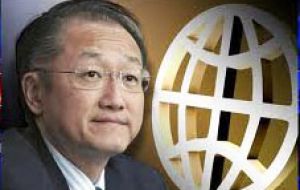MercoPress. South Atlantic News Agency
World Bank preparing for when US begins to slow money creation
 When that happens, “borrowing costs will go up and we think they will also go up for developing countries”, said WB president Jim Yong Kim
When that happens, “borrowing costs will go up and we think they will also go up for developing countries”, said WB president Jim Yong Kim The World Bank is concerned about the spill-over effects on developing countries of a slowing of US money creation and will move to provide affordable capital when borrowing costs rise.
The US Federal Reserve has sparked a bout of financial market turmoil since its chief, Ben Bernanke, announced on May 22 that the Fed could, before the year is out, begin slowing the pace at which it creates dollars.
Emerging markets, the recipients of much of that money as it has been printed, have borne the brunt of investors taking fright.
“We're constantly watching what the spill-over effects are of these unconventional monetary policies on developing countries especially” World Bank president Jim Yong Kim told reporters.
”If the United States does back off ... and slows down its (asset-buying) quantitative easing, borrowing costs will go up and we think they will also go up for developing countries. And that's a real concern.“
Kim did not expect capital outflow from emerging markets on anything like the scale seen in the Asian financial crisis of the late 1990s. Nor did he expect the Fed's policy switch to be ”short and sharp“.
”Ben Bernanke ... has been a clear and steady voice on what's needed,“ he said.
But he conceded that a world economy awash with money created by central banks, and with Japan now embarking on an unprecedented stimulus program, was in ”uncharted territory“.
”If the price of capital starts going up then we are going to have to move to find ways of creating new instruments for making capital available for infrastructure,“ Kim said.
The bank is working on a global infrastructure facility to do that. Kim said middle income countries were prepared to invest because they knew World Bank involvement would ”crowd in“ private capital too.
”We think this is urgent so we are moving pretty aggressively,“ he said. ”As interest rates go up we have to work to provide capital at rates which make sense for developing countries.




Top Comments
Disclaimer & comment rulesCommenting for this story is now closed.
If you have a Facebook account, become a fan and comment on our Facebook Page!